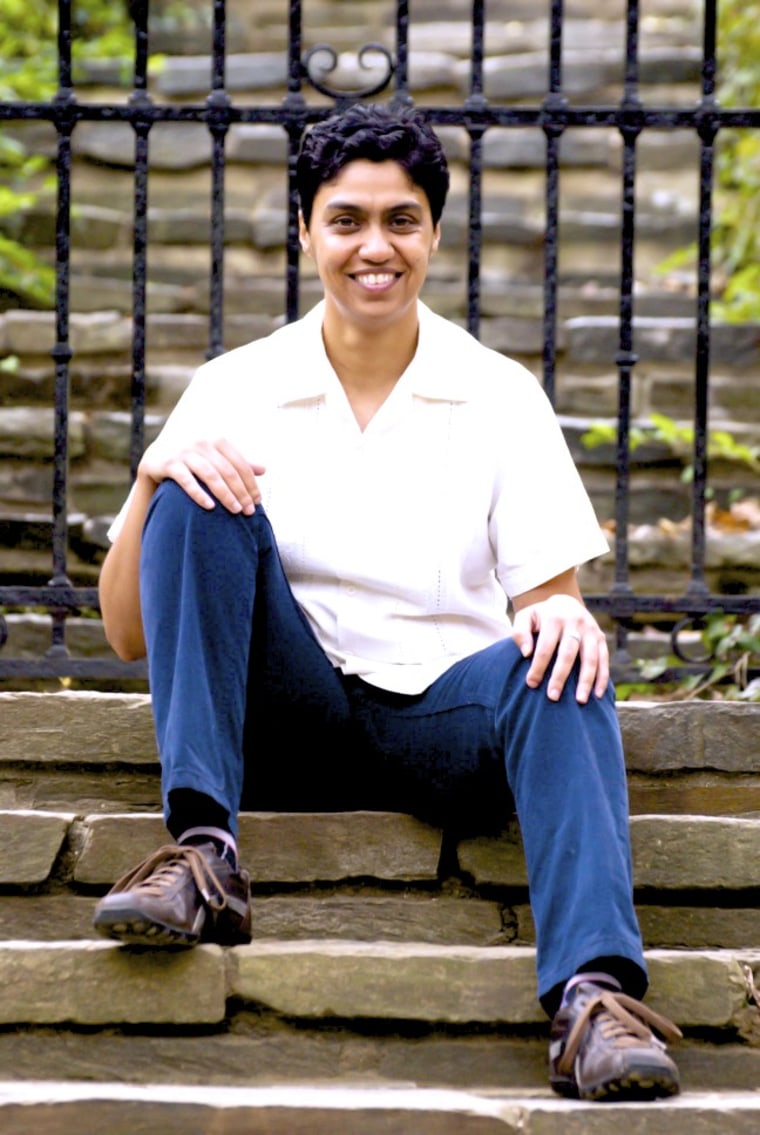When queer Muslim advocate Sahar Shafqat was growing up in Pakistan — a country with few rights for LGBTQ people — she knew she couldn’t tell anyone she was a lesbian. The secret weighed on her.
“I just distinctly remember that sensation of that feeling of I cannot breath,” Shafqat told NBC Out.

In 1989, the activist moved to the United States to attend Mt. Holyoke, an all-women’s liberal arts college in Massachusetts. There, she dated women openly for the first time. She said it felt good to finally be out, but being Muslim in the United States was like “trading one form of suffocation for another.”
“I was unprepared for the way America would perceive me, especially from a racial perspective,” said Shafqat, now a political science professor at St. Mary's College of Maryland. She said before the 9/11 terrorist attacks, many people mistook her for Indian. But afterward, they increasingly saw her as Middle Eastern (Pakistan, which borders India, is in South Asia). She said people also assumed she was religious. That surprised Shafqat, who is culturally Muslim, but not observant.
“I think the journey that I set off on since 9/11 was basically kind of understanding and owning my own Muslim identity,” the she said.
“It would be really easy for queer Muslims to say, ‘Yes, look how horrible Muslims are, they hate queer people,’ because many of us have experienced rejection from our own community ... And yet that’s not a solution, because giving into Islamophobia doesn’t help us either.”
Being both Muslim and LGBTQ can “feel impossible,” according to Shafqat. LGBTQ Muslims deal with Islamophobia within the LGBTQ community on the one hand, and homophobia within the Muslim community on the other, she explained.
“Sometimes I just feel like I’m going to break, because it’s a lot to handle,” she said. In the years following the 9/11 attacks, Shafqat became aware that other LGBTQ Muslims felt the same.
“What kind of tied us together was that the world was assuming things about us that were completely untrue,” she explained.
“I realized I’m really caught in this in-between, uncomfortable, kind of no-man’s land that a lot of us were in,” she continued. “I really wanted to help do something about that.”
In 2011, several activists reached out to Shafqat about forming a group for LGBTQ Muslims. They met at the Creating Change Conference in Minneapolis, where they founded the Muslim Alliance for Sexual and Gender Diversity. The only nationwide group for LGBTQ Muslims, the organization focuses on creating a safe and accepting atmosphere for its members. Every year, the group holds a retreat for LGBTQ Muslims and their partners.
“It’s a really empowering space, and it’s a time and place where a lot of these folks connect with each other in a queer Muslim space, which is just so precious, because a lot of times queer people are often disconnected from each other, and then put on top of that being a Muslim,” Shafqat said.
The group is racially and ethnically diverse, and it focuses on inclusivity, particularly combating anti-black racism, according to Shafqat. She said the group also fights for greater acceptance within the Muslim community.
“It would be really easy for queer Muslims to say, ‘Yes, look how horrible Muslims are, they hate queer people,’ because many of us have experienced rejection from our own community,” she said. “And yet that’s not a solution, because giving into Islamophobia doesn’t help us either.”
Related: Former Mormon Opens Center for LGBTQ Teens, Families
Some Muslims have come forward as LGBTQ allies, Shafqat said. After the 2016 Pulse nightclub shooting, the Muslim American Women's Policy Forum organized a vigil in Washington D.C., where Shafqat lives. They asked Shafqat to give a speech.
“We realized we have more straight Muslim allies than we thought,” she said.
Shafqat regularly visits Pakistan to see her family, who continued to love and support her after she came out. She said her family traveled to the U.S. to attend her wedding in 2010. Her wife’s family, who are from India, also came to celebrate the marriage.
“There was a time in my life when I was really scared, and I was really convinced that I wouldn’t be able to have a full and rich and meaningful and happy life, and I do,” Shafqat said.
Now, the advocate is motivated to help other LGBTQ Muslims feel safe and empowered in their own identity.
“I just want to make life easier for other people who are like me,” Shafqat concluded.
OutFront is a weekly NBC Out series profiling LGBTQ people who are making a positive difference in the community.
